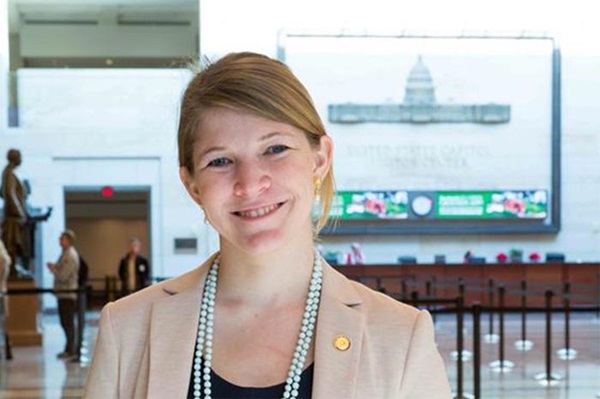When Jane Adams (MTS 2016) first came to Wesley Theological Seminary to pursue a Master of Theological Studies, she had one main question: Why seek good in the field of politics? That question remained with her as she attended classes on systematic theology, racism, sexism and the role of religion in politics.
Wesley Theological Seminary is one of the 13 United Methodist seminaries supported by the Ministerial Education Fund apportionment.
"I've been involved in politics since I was 17, working on political campaigns, working on policy, working for a congressman here in D.C., but I still felt like there was something missing," Adams said. "And that was, why seek good when seeking power or control or dominance is so much more politically expedient and rewarded in our country and our political systems. Why should we seek good in what we do?"
Adams found a deeply rooted synergy between religion and politics while at Wesley that began to answer her question. The relationship between her Christian faith and public policy took shape as she explored public theology classes.
"When I came to seminary, I wanted to learn as much as I possibly could about how Christianity and Scripture can inform the way I live my life in the political world," she said. "When I began to take some of the public theology classes at Wesley, I began to realize that God made me really good at figuring out systems and structures, and pointing to where they lack in providing human dignity to people."
"Wesley taught me to see through rhetoric and be able to identify how decisions will either help or hurt people," she said. "My degree at Wesley gave me the skills that I needed to be able to not just stop at 'there's a problem,' but say, 'what is my role as a Christian in bringing heaven to earth and finding solutions?'"
Adams now searches for those solutions as a domestic policy analyst for Bread for the World, an international non-profit based in Washington, D.C., that seeks to end poverty and hunger in the United States and abroad. Each day she uses what she learned at Wesley to advocate for public policies that protect the dignity of low-income families and says her degree from Wesley is the reason she is good at what she does.
A particularly helpful class for Adams was the National Capital Semester for Seminarians (NCSS), which brings together seminarians throughout the United States to study faith and politics in the nation's capital for a semester.
"I came to Wesley because they understood, like no other seminary in the United States, the importance of political engagement and how Christian teaching informs politics, and especially the American government," Adams said. "You can't really be an effective minister unless you know how your country is affecting the lives of your parishioners. Wesley gets that. I don't think any other seminary does."
Wesley Theological Seminary website
One of seven apportioned giving opportunities of The United Methodist Church, the Ministerial Education Fund is at the heart of preparing people for making disciples of Jesus Christ for the transformation of the world. The 13 United Methodist seminaries help students to discover their calling through the challenging curriculum. The fund enables the church to increase financial support for recruiting and educating ordained and diaconal ministers and to equip annual conferences to meet increased demands. Please encourage your leaders and congregations to support the Ministerial Education Fund apportionment at 100 percent.





